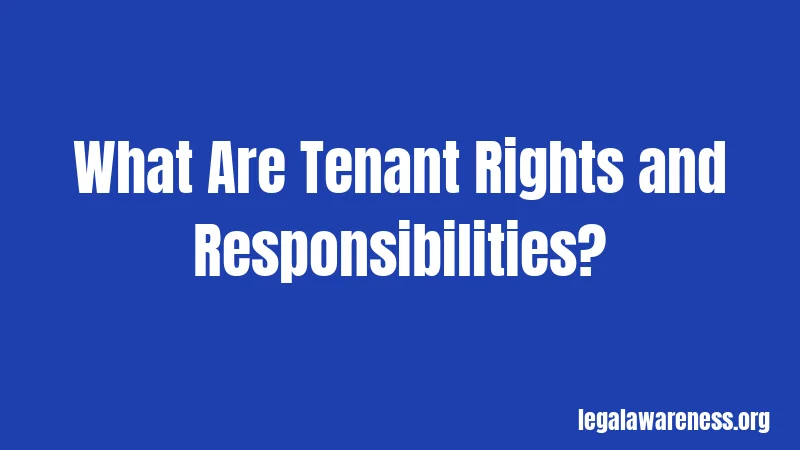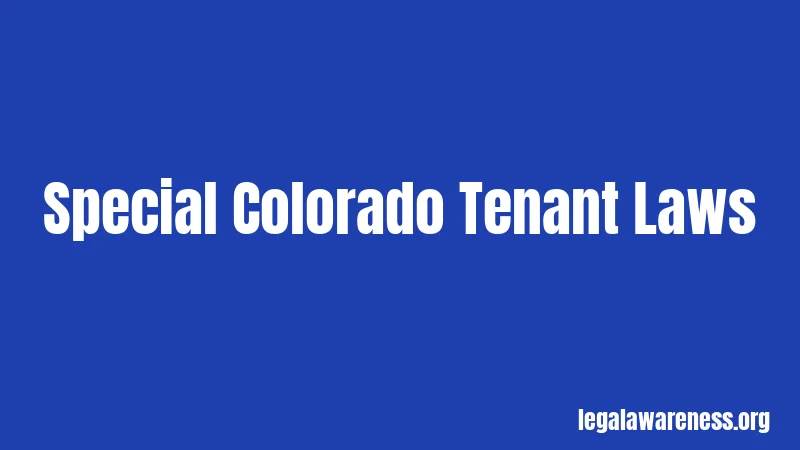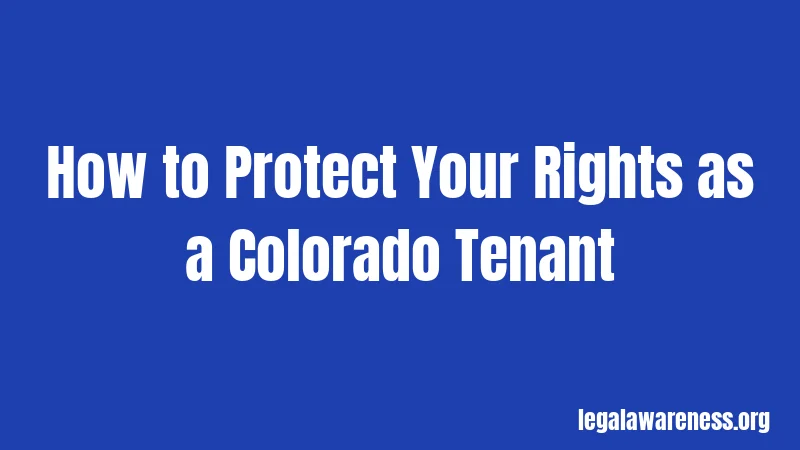Colorado Tenant Laws in 2026: Your Rights and Protections
Most renters don’t know how much legal protection they actually have. Seriously. But in Colorado, tenant laws are actually pretty strong, and they’re there to protect YOU. Whether you’re renting a house, apartment, or condo, you need to understand your rights. The good news? We’re breaking it all down for you right here.
Colorado has some of the more progressive tenant protections in the country. If you’ve ever wondered what your landlord can and can’t do, or what you’re required to pay for, stick around. We’ll cover everything you need to know to stay informed and protected.
What Are Tenant Rights and Responsibilities?

Think of it like this. Tenant laws are the rules that protect both renters and landlords. They say what each person can do, what they can’t do, and what happens when someone breaks the rules.
In Colorado, tenant rights are covered under the Colorado Residential Tenancies Act (CRS 38-12-101 and beyond). This law makes sure that renters have safe, healthy places to live. It also makes sure landlords can actually run their rental business fairly. Pretty straightforward, right?
Your job as a tenant is simple. Pay your rent on time, don’t damage the place, and follow the lease terms. Your landlord’s job? Maintain the property, make repairs when needed, and respect your privacy. When both sides follow the rules, everything works smoothly.
Basic Colorado Tenant Laws
Security Deposits
Here’s where things get interesting. Your landlord can ask for a security deposit. But there are strict rules about what they can do with it.
In Colorado, security deposits must be held in a neutral third-party account. This means your landlord can’t just throw your deposit money in their personal bank account. It’s protected. Also, your landlord must pay you interest on that deposit if they hold it for more than one year. The interest rate is pretty low, but it’s the law.
When you move out, your landlord has 30 days to return your deposit with an itemized list of any deductions. Got that? 30 days. If they take longer, you could be owed extra money. Wondering what they can actually deduct? Normal wear and tear doesn’t count. Holes you punched in the wall? That counts. Stains from spilled coffee? Maybe, depends on the situation. Damage that requires repairs beyond normal wear? Definitely counts.
Not following these rules is a big deal. If your landlord wrongfully keeps your deposit, you can sue them in small claims court. You could even get three times the amount they owe you plus attorney fees. Yeah, that’s serious.
Lease Terms and Rent Increases
Let’s talk about your lease. This is your contract with your landlord. It spells out everything from rent amount to pet policies. Make sure you read it before you sign. I mean really read it.
Your landlord can raise your rent, but they have to follow specific rules. If you have a lease with a set end date, they can’t raise your rent until the lease expires. When the lease is up, they need to give you written notice of the increase at least 30 days before your current lease ends. If you’re in a month-to-month situation, they still need to give you 30 days’ notice for any increase.
Here’s something most people miss. Your rent increase must be “reasonable.” Colorado law doesn’t set a specific cap on increases, but courts can look at whether the increase seems excessive compared to market rates. If your landlord tries to raise your rent by 50% overnight, that could be challenged.
Stay with me here. These rules protect you from being forced out through unreasonable rent hikes. It gives you time to decide if you want to stay or find somewhere new.
Maintenance and Repairs
Okay, this one’s important. Your landlord is legally required to keep the rental property in decent, safe condition. This means the roof needs to work, the plumbing needs to function, and the heat needs to actually produce warmth during winter. Makes sense, right?
If something breaks or stops working, you need to tell your landlord in writing. Send an email, text message, or letter that describes the problem clearly. Your landlord then has a reasonable amount of time to fix it. For urgent stuff like broken heat in winter or a major water leak, “reasonable” means pretty quickly, like within 24 to 48 hours. For less urgent issues, it could be a few weeks.
If your landlord ignores the repair for too long, you have options. You can hire someone to fix it and deduct the cost from your rent. Or you can withhold rent until it’s fixed. Or, in serious cases, you can break your lease without penalty. But you’ve got to follow the right steps. Write to your landlord first and give them reasonable time to respond.
Colorado law also says your landlord must provide certain basic stuff. A working toilet and sink. Hot water. Adequate heating. Functioning appliances that came with the unit. No lead paint hazards. No serious pest infestations. These aren’t luxuries. They’re requirements.
Right to Privacy
Your landlord owns the property, but once you move in, it’s your home. And your home needs to stay private.
Your landlord can’t just barge in whenever they want. They need a legal reason and they need to give you notice. Usually, that notice is 24 hours in advance, though it can vary depending on the situation. Emergency situations are different. If there’s a fire, flood, or gas leak, your landlord can enter immediately without notice.
What counts as a legal reason to enter? Repairs and maintenance. Showing the property to potential tenants or buyers. Inspection for code violations. Pest control. That kind of stuff. Your landlord can’t come over just to see how you’re decorating your living room. They can’t check up on you constantly.
If your landlord violates your right to privacy, you have legal recourse. You could break your lease, pursue damages in court, or file a complaint with your local housing authority. Make sure you document when your landlord enters and why. Keep records.
Special Colorado Tenant Laws

Eviction Rules in Colorado
Nobody wants to think about eviction, but you should understand how it works. Colorado has pretty strict rules about how landlords have to evict tenants. They can’t just change the locks. They can’t throw your stuff on the street. They have to go to court.
First, your landlord has to give you written notice to cure (fix) the problem or vacate (move out). For non-payment of rent, this notice period is typically 10 days. For other lease violations, it can be 30 days. Your landlord can’t skip this step.
If you don’t pay the rent or fix the problem within that time, your landlord can file for eviction in court. You get a chance to respond and defend yourself. There’s an actual court hearing. You can show up and explain your side. The judge decides whether the eviction is legal.
Colorado has also made it illegal for landlords to evict you for certain reasons. You can’t be evicted for requesting repairs. You can’t be evicted for reporting code violations to the health department. You can’t be evicted in retaliation for exercising your legal rights. These are called “retaliatory evictions,” and they’re not allowed.
The whole eviction process takes time. Even if your landlord wins, they still have to wait for a sheriff to physically remove you. It’s not fast. It’s not easy. But it protects tenants from being suddenly homeless.
Automatic Renewal and Early Lease Termination
Here’s something that catches people off guard. If your lease doesn’t have a specific end date, it could automatically renew. Colorado allows automatic renewal, but only if your lease clearly states that it will renew automatically. You have to agree to this in writing.
Now, here’s where it gets important. Your landlord has to give you written notice before the automatic renewal happens. Usually that’s 30 to 60 days before your lease term ends. If they don’t give you that notice, the lease doesn’t automatically renew. You become a month-to-month tenant instead.
Want to leave early before your lease ends? You can try to negotiate with your landlord or find someone to take over your lease. But there’s no legal right to break your lease early unless the property becomes uninhabitable or your landlord seriously violates the lease terms.
Military Personnel and Servicemembers
If you’re in the military, Colorado has special protections for you. The federal Servicemembers Civil Relief Act (SCRA) gives military personnel extra rights when it comes to housing.
If you’re deployed or transferred suddenly, you might be able to break your lease early without penalty. You might get a rent reduction. Your landlord might not be able to charge certain fees. The specific rules depend on your situation, but basically, Colorado tries to help military families who face unexpected moves.
If you’re military, look into your specific rights. Talk to your base legal office or a local legal aid organization. They can help you understand your protections.
Penalties and Consequences
So what actually happens if someone breaks these laws? Let’s get specific.
If your landlord wrongfully keeps your security deposit, you could get your money back, three times the deposit amount, plus attorney fees if you take them to court. That adds up fast. If your landlord won’t make required repairs and you have to fix them yourself, you can deduct those costs from rent. If your landlord violates your privacy rights, you could break the lease without penalty and potentially sue for damages.
For tenants, breaking the lease early without legal cause could mean losing your security deposit or being sued for remaining rent payments. If you stop paying rent without a legal reason, your landlord can evict you. Seriously damaging the property could result in deduction from your deposit and potential legal action.
Retaliation by your landlord is illegal, but if it happens, you need to document it carefully. Emails, text messages, written notice dates. Save everything. If you can prove retaliation, you have grounds to break the lease or sue.
The point? Both sides need to follow the rules. When they don’t, there are real consequences.
How to Protect Your Rights as a Colorado Tenant

Here’s what you need to do practically. First, get everything in writing. Your lease, any agreements with your landlord, maintenance requests, all of it. Text messages and emails count. This protects you if there’s ever a dispute.
Second, document the condition of the property when you move in. Take photos and videos of everything. Note any damage, stains, broken things. Send your landlord a written list within a few days of moving in. This way, when you move out, they can’t blame you for damage that was already there.
Third, keep all receipts and records related to your rental. Rent payments, repair receipts, correspondence with your landlord. Organize it and keep it safe.
Fourth, understand your lease before you sign it. Ask questions about anything that’s unclear. If something seems unfair, negotiate it before you sign.
Fifth, know your local tenant rights organizations. Colorado has legal aid organizations and tenant unions that can help if you get stuck. Bookmark their websites now, before you need them.
If your landlord isn’t following the law, write them a formal letter. Be specific about what they’re doing wrong and what you want them to do about it. Keep a copy for yourself. If they still don’t respond, you can file a complaint or seek legal help.
Frequently Asked Questions
Can my landlord keep any part of my security deposit for normal wear and tear? No. Normal wear and tear is the landlord’s responsibility. Carpet fading, minor scuffs on walls, worn-out fixtures that came with the unit—those can’t be deducted. Only damage beyond normal use can be deducted.
What if my landlord enters my apartment without notice? That’s a violation of your right to privacy. Document when it happened, what time, and how they got in. Write to your landlord in response and tell them to stop. If it continues, you might be able to break your lease or pursue legal action.
Does Colorado have rent control? No, Colorado doesn’t have statewide rent control. Landlords can raise rent, but they need to give you 30 days’ notice and the increase needs to be reasonable. Some local cities have their own rules, so check your city’s policies.
How long does my landlord have to return my security deposit after I move out? 30 days. If they don’t return it within 30 days with an itemized list of deductions, you can take legal action to get it back plus three times the deposit amount.
Can my landlord evict me without going to court? No. Colorado requires landlords to go through the court system to evict someone. Self-help evictions like changing locks or removing belongings are illegal and can get your landlord in serious trouble.
What should I do if my landlord won’t make necessary repairs? First, send a written request for repairs. Give them reasonable time to respond. If they don’t, you can hire someone to fix it and deduct the cost from rent, or you can contact a local legal aid organization for help. Never just stop paying rent without following the legal process.
Final Thoughts
Colorado has solid tenant protections. Your landlord has to maintain the property, respect your privacy, and follow specific rules about deposits and evictions. You have rights, real ones, and they’re worth knowing about.
Here’s the bottom line. Get everything in writing. Document everything. Know your lease. Understand the law. And don’t hesitate to reach out for help if something doesn’t feel right. The more informed you are, the better you can protect yourself.
Stay informed, stay safe, and remember—you’re not alone. Plenty of tenants have dealt with housing issues. When in doubt, contact a local legal aid organization or a tenant rights group. They exist to help people exactly like you.
References
- Colorado Residential Tenancies Act (CRS 38-12-101 et seq.) – https://leg.colorado.gov/bills/
- Colorado Division of Housing – https://cdola.colorado.gov/
- Colorado Lawyer Referral Service – https://www.colorado.org/
- Legal Aid Foundation of Colorado – https://www.legalaidofcolorado.org/
- Colorado Apartment Association – https://www.caahq.org/
- U.S. Department of Housing and Urban Development (HUD) – https://www.hud.gov/
- Colorado Attorney General’s Office Consumer Protection – https://coag.gov/
